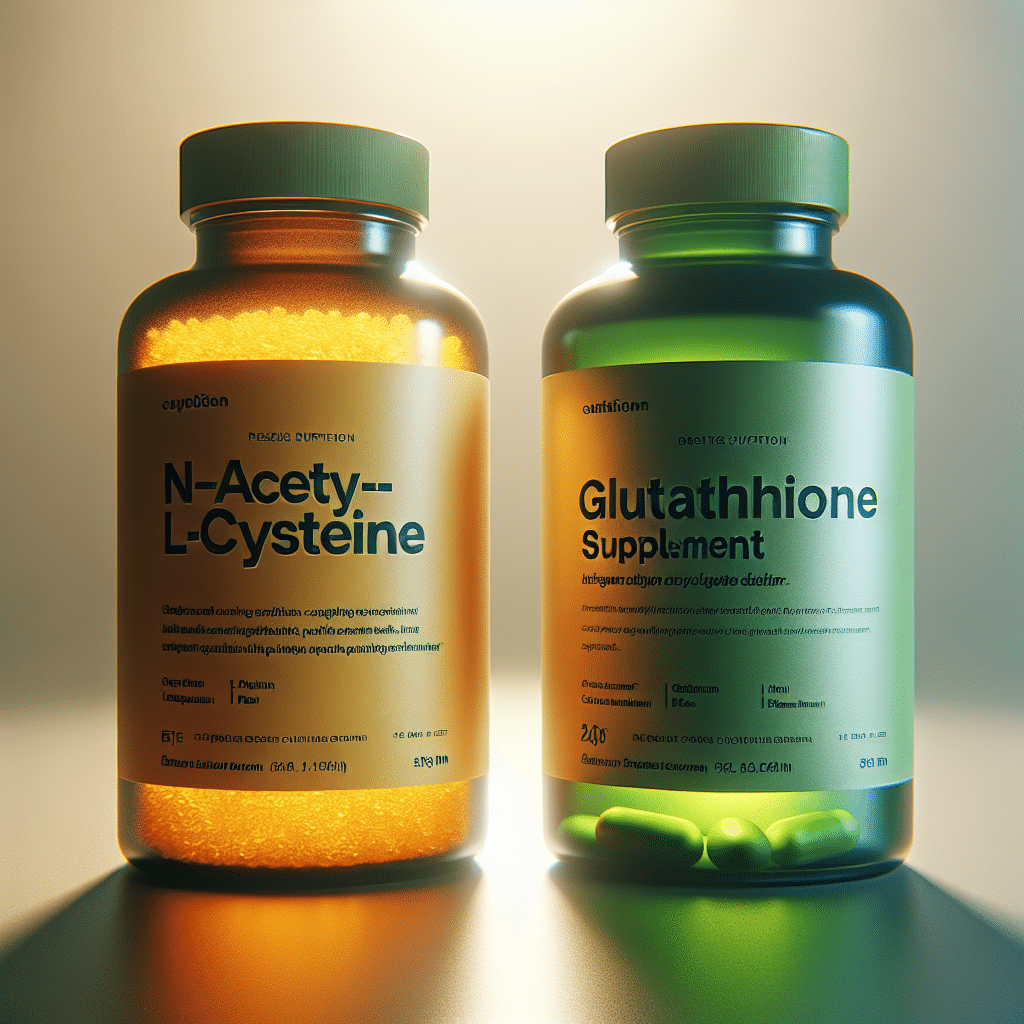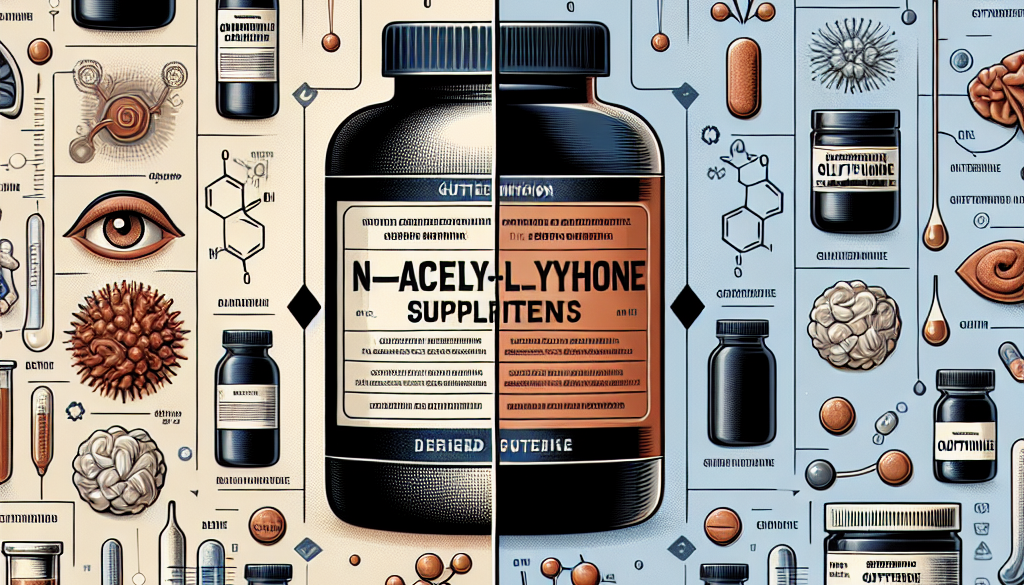N-Acetyl-L-Cysteine vs Glutathione Supplement
-
Table of Contents
- N-Acetyl-L-Cysteine vs Glutathione: Comparing Antioxidant Supplements
- Understanding N-Acetyl-L-Cysteine (NAC)
- The Role of Glutathione in the Body
- Comparing NAC and Glutathione Supplements
- Availability and Absorption
- Health Benefits
- Side Effects and Safety
- Cost and Convenience
- Scientific Research and Case Studies
- Choosing the Right Supplement for Your Needs
- Conclusion: NAC or Glutathione?
- Enhance Your Health with ETprotein’s Protein Products
N-Acetyl-L-Cysteine vs Glutathione: Comparing Antioxidant Supplements

Antioxidants play a crucial role in maintaining health by combating oxidative stress and protecting the body from damage caused by free radicals. Among the most discussed antioxidants are N-Acetyl-L-Cysteine (NAC) and Glutathione, both of which have unique properties and health benefits. This article delves into the differences between NAC and Glutathione supplements, their benefits, and how to choose the right one for your health needs.
Understanding N-Acetyl-L-Cysteine (NAC)
N-Acetyl-L-Cysteine, or NAC, is a modified form of the amino acid cysteine with an acetyl group attached to it. This modification enhances its stability and allows it to be efficiently absorbed when taken as a supplement. NAC is a precursor to Glutathione, meaning it is one of the necessary components the body uses to synthesize Glutathione.
- NAC is recognized for its role in replenishing Glutathione levels in the body.
- It has mucolytic properties, helping to break down mucus in the respiratory system.
- NAC is used in medical settings to treat acetaminophen (Tylenol) poisoning.
- It may have neuroprotective effects and is being studied for its potential in psychiatric and neurological disorders.
The Role of Glutathione in the Body
Glutathione is often referred to as the “master antioxidant” due to its central role in the body’s antioxidant defense system. It is a tripeptide composed of three amino acids: cysteine, glutamate, and glycine. Glutathione is found in every cell of the body and is essential for maintaining cellular health and function.
- Glutathione directly neutralizes free radicals and reactive oxygen species.
- It is involved in the detoxification process, helping to eliminate harmful substances from the body.
- Glutathione supports immune function and is crucial for the optimal performance of T-cells.
- It plays a role in the regeneration of vitamins C and E, recycling these antioxidants.
Comparing NAC and Glutathione Supplements
When choosing between NAC and Glutathione supplements, it’s important to understand their differences and how they may affect your health.
Availability and Absorption
NAC is readily available as an oral supplement and has a stable molecular structure that allows for good absorption in the gastrointestinal tract. Glutathione supplements, on the other hand, were once thought to be ineffective due to poor absorption. However, recent advancements have led to the development of more bioavailable forms of Glutathione, such as liposomal Glutathione and acetylated Glutathione.
Health Benefits
Both NAC and Glutathione offer a range of health benefits, but their effects can differ. NAC’s mucolytic properties make it particularly beneficial for respiratory conditions, while Glutathione’s widespread presence in cells makes it a more general antioxidant.
Side Effects and Safety
NAC is generally considered safe with few side effects, though high doses can cause gastrointestinal discomfort, rash, or headache. Glutathione is also well-tolerated, but some forms may cause abdominal cramps and bloating.
Cost and Convenience
NAC supplements are typically less expensive than Glutathione supplements and are widely available. Glutathione supplements can be more costly, especially the more bioavailable forms.
Scientific Research and Case Studies
Several studies have highlighted the benefits of both NAC and Glutathione. For instance, NAC has been shown to improve symptoms of chronic bronchitis and reduce the frequency of flare-ups in patients with chronic obstructive pulmonary disease (COPD). Glutathione has been studied for its potential in reducing oxidative stress in diseases such as Parkinson’s and Alzheimer’s.
Choosing the Right Supplement for Your Needs
When deciding between NAC and Glutathione supplements, consider your specific health goals and needs. If you’re looking for general antioxidant support, Glutathione might be the better choice. If you’re targeting respiratory health or detoxification, NAC could be more beneficial.
Conclusion: NAC or Glutathione?
Both NAC and Glutathione supplements offer significant health benefits, but they serve different purposes. NAC is a valuable precursor to Glutathione and has unique properties that make it suitable for certain health conditions. Glutathione is a powerful antioxidant that provides broad-spectrum support for cellular health. Ultimately, the choice between NAC and Glutathione should be based on individual health needs and goals, as well as consultation with a healthcare professional.
Enhance Your Health with ETprotein’s Protein Products
In addition to considering antioxidant supplements like NAC and Glutathione, incorporating high-quality protein into your diet is essential for overall health. ETprotein offers a range of organic bulk vegan proteins that can complement your health regimen. Their products, including Organic rice protein, pea protein, and various seed proteins, provide a neutral taste and are non-GMO and allergen-free. For those interested in advanced antioxidants, ETprotein also supplies L-(+)-Ergothioneine (EGT) in various grades suitable for different industries.
About ETprotein:
ETprotein, a reputable protein and L-(+)-Ergothioneine (EGT) Chinese factory manufacturer and supplier, is renowned for producing, stocking, exporting, and delivering the highest quality organic bulk vegan proteins and L-(+)-Ergothioneine. They include Organic rice protein, clear rice protein, pea protein, clear pea protein, watermelon seed protein, pumpkin seed protein, sunflower seed protein, mung bean protein, peanut protein, and L-(+)-Ergothioneine EGT Pharmaceutical grade, L-(+)-Ergothioneine EGT food grade, L-(+)-Ergothioneine EGT cosmetic grade, L-(+)-Ergothioneine EGT reference grade and L-(+)-Ergothioneine EGT standard. Their offerings, characterized by a neutral taste, non-GMO, allergen-free attributes, with L-(+)-Ergothioneine purity over 98%, 99%, cater to a diverse range of industries. They serve nutraceutical, pharmaceutical, cosmeceutical, veterinary, as well as food and beverage finished product distributors, traders, and manufacturers across Europe, USA, Canada, Australia, Thailand, Japan, Korea, Brazil, and Chile, among others.
ETprotein specialization includes exporting and delivering tailor-made protein powder and finished nutritional supplements. Their extensive product range covers sectors like Food and Beverage, Sports Nutrition, Weight Management, Dietary Supplements, Health and Wellness Products, and Infant Formula, ensuring comprehensive solutions to meet all your protein needs.
As a trusted company by leading global food and beverage brands and Fortune 500 companies, ETprotein reinforces China’s reputation in the global arena. For more information or to sample their products, please contact them and email sales(at)ETprotein.com today.












